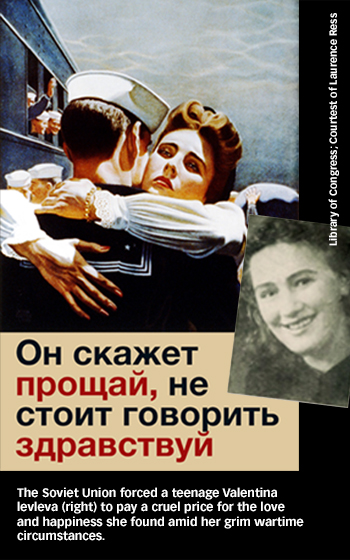
Of all the places I’ve been, the port of Archangel in the north of Russia is the least romantic. The climate is terrible—cold and dank most of the year—and ships lie rusting in the harbor. From the drunks on the street to the graf-fiti on the walls, nothing in Archangel spoke to me of beauty.
But looks can deceive. During the Second World War, this remote port was a vision of romance for a teenage Valentina Ievleva, thanks to British and American sailors who crewed convoys supplying Russia and frequented the International Club down on the seafront.
So did Valentina. “I’d never seen such comfort as I saw in the Inter-national Club,” she told me when we met in Moscow a few years ago, when she was a sprightly 80 years of age. “It was inside an old merchant’s house, and when you came in there was carpet and it was so soft that you didn’t even hear your footsteps. Once a week there was a dance, and I danced from 8 p.m. to 4 a.m.,” Valentina recalled. “I danced and danced. I never sat down…. I couldn’t live without it.”
Inevitably, Valentina went on dates with foreign sailors, and found them very courteous—in sharp contrast to local men. “If a Russian took me home, he took it for granted that I would invite him inside,” she said. “They didn’t want to waste time. If they met someone they liked, they didn’t want to waste any time on courtship, they just wanted to have this girl, whereas the Westerners were different.”
For one thing, Allied sailors carried riches almost beyond imagining. “If they came to your home, they brought you soup and canned meat and sausage and whatever they had,” she said. “There were biscuits; I will remember it forever. There was peanut butter in those biscuits. It
was so delicious. I still remember this…. I don’t think we were selling ourselves. But I’m not denying the material factor. It was also important to get something material. Let’s face facts—it helped you survive.”
Valentina dreamed of fame. “Everyone was saying, ‘You’re so beautiful—if you came to Hollywood you would become famous,’” she said. “I just wanted to be an actress. I had no idea whatsoever about American life. I was very young and I was thoughtless…. Everyone was admiring me. Everyone was open and I greeted them in the same way. The world looked wonderful.” In her diary she wrote, “To be an actress in America you only have to be beautiful. And here? To be beautiful is not enough, you have to have 10 years of schooling.”
Valentina met an American sailor from Brooklyn. They slept together. He told her, “We are married. You are my wife, I am your husband,” and she dreamed of a new life in the USA.
Valentina’s relationship with the American lasted four months. She became pregnant. By the time the baby was born, in February 1945, her boyfriend had sailed. As a single mother with a baby fathered by a foreigner, Valentina drew the interest of the secret police. Finding her diary, investigators charged her with spying for the Americans and the British.
“My investigator was saying, ‘Tell me about your spying activities,’ and I was only smiling at him,” she said. “What could I have done? How could I be guilty? Of loving someone?”
Over and over, her captors demanded, “Tell me about your spying activities.” The authorities sentenced her to six years in a northern gulag. She was made to work under appalling conditions, chopping wood in a forest. On her release she and her child reunited, but the trauma of her captivity lived on. She suffered severe insomnia the rest of her life. But even with hindsight, she said, she would not have acted differently.
“I remember those years [of the Inter-national Club] as the best years of my life,” Valentina told me. “I would be ready to go to the gulag for 10 more years if I could spend three years living like that—the love, the admiration, the compliments. It’s like a drug.”




